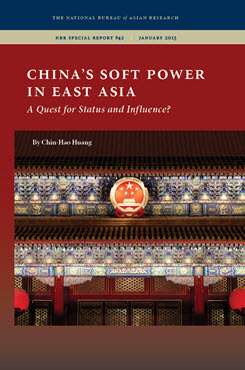NBR Special Report no. 42
China's Soft Power in East Asia
A Quest for Status and Influence?
This report examines China’s use of soft power as a foreign policy tool and analyzes the strategic, economic, and political implications for U.S. policy in East Asia.
EXECUTIVE SUMMARY
MAIN ARGUMENT
The practice of soft power has become an attractive policy option for China to help demonstrate its commitment to a “peaceful rise.” This has resulted in Beijing’s attempt to use an increasing array of foreign policy tools beyond material hard power in its interactions in East Asia, including development assistance, trade, and cultural exchanges. However, China’s massive push to project soft power has not directly translated into more supportive views of its quest for status and legitimacy. This limited appeal derives from (1) Beijing’s decision to demonstrate its resolve on regional territorial disputes with military coercion and (2) the lack of serious political reform in China. With respect to the latter, it will be increasingly difficult for the government to prevent its domestic record on political and civil freedoms from affecting China’s international credibility. As the new leadership charts its foreign policy priorities, it will have much to contemplate about why it remains so difficult to generate and sustain soft power commensurate with China’s remarkable economic might.
POLICY IMPLICATIONS
- Chinese soft power can be a positive force multiplier that contributes to peace and stability in the Asia-Pacific and thus provides Beijing an opportunity to reset the direction of its foreign policy more generally. If Beijing decides to do so, Washington should strengthen existing security and economic architectures to discourage China’s more bellicose tendencies and ensure that it embraces multilateralism.
- At the same time, Washington should be cognizant of the frustrations that are bound to occur in bilateral relations if Beijing continues to define national interest in narrow, self-interested terms. The U.S. should engage more deeply with regional partners to persuade and incentivize China to take on a responsible great-power role commensurate with regional expectations.
- The U.S. pivot to the region could be further complemented with an increase in soft-power promotion, including increasing the level of support for Fulbright and other educational exchanges that forge closer professional and interpersonal ties between the U.S. and the Asia-Pacific. Washington should also encourage philanthropy, development assistance, and intellectual engagement by think tanks and civil society organizations that address issues such as public health and facilitate capacity-building projects.


